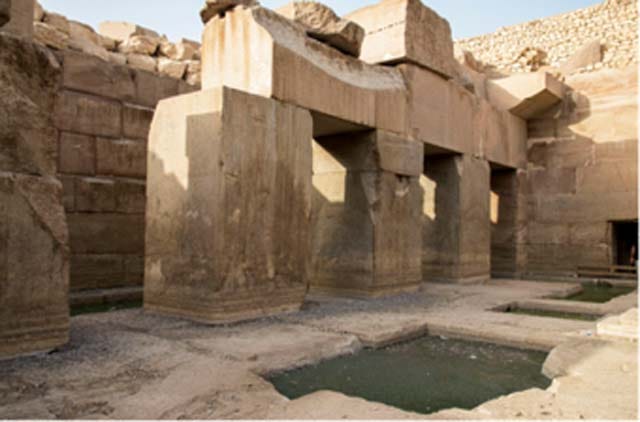The True Age of the Osirion at Abydos, an Antediluvian Temple
By 5400 BC Abydos in Egypt was a thriving city, and 2,000 years later pre-dynastic pharaohs were still building shrines, temples and mortuaries at the site. Seti I added his own masterpiece in the 13th century BC, an elegant temple featuring a series of interconnected halls and side chambers, covered from floor to ceiling in exquisite friezes, murals and hieroglyphs. Still, people had long before been coming here to witness another hidden wonder - the Osirion, perhaps an antediluvian structure?
The Inland Sea of North Africa
About 12,000 years ago the region bore no resemblance to what it is today. The climate was wetter, it sustained a lush landscape, and to the west, where now lies an endless desert, there existed an inland sea, much of which drained into the Atlantic when the events that generated the great flood, and closed the Younger Dryas, overhauled the region. Referring to an older source, Diodorus of Sicily describes how it: "disappeared from sight in the course of an earthquake, when those parts of it which lay toward the ocean were torn asunder," leaving behind the Sahara. A small saltwater lake at Siwa is all that remains.
The Enigma of Osirion’s Architecture
The course of the Nile was also seven miles closer to the town, its waters reaching another kind of temple, named for the Egyptian god of resurrection Osiris — the Osirion. In terms of construction and style, the temple bears no resemblance to Seti’s. It is stark yet hauntingly beautiful, a fine example of simplicity and economy of line expressed with heavyset blocks of red granite, ferried from a quarry 200 miles (321 kilometres) away. The construction logistics pose a conundrum for any engineer, yet the Osirion belongs to a remote age, created with the sole intent of defying time.

The Osirion consists of two rows of columns connected by substantial architraves upon which once stood a voluminous stone roof. These are poised on a raised rectangular platform surrounded by a deep moat cut into the stone; two ascending staircases lead out of the water and onto the platform, where lie two sunken rectangular pools.
The surrounding courtyard itself is one massive and impenetrable wall of 25-foot (7.6 meters) thick red sandstone, fitted without mortar, with corner stones cut and angled much like they are in Cuzco, Peru. Seventeen side chambers fit into the wall and face the central court. The plan of the courtyard bears a passing resemblance to the head of Pachacamac (creator deity of Peru) carved above the Sun Door at Tiwanaku (Bolivia). It's a passing observation for sure, but the same cannot be said for the knobs carved in relief on sections of the courtyard wall, for they are identical to those in the Andean temples.




